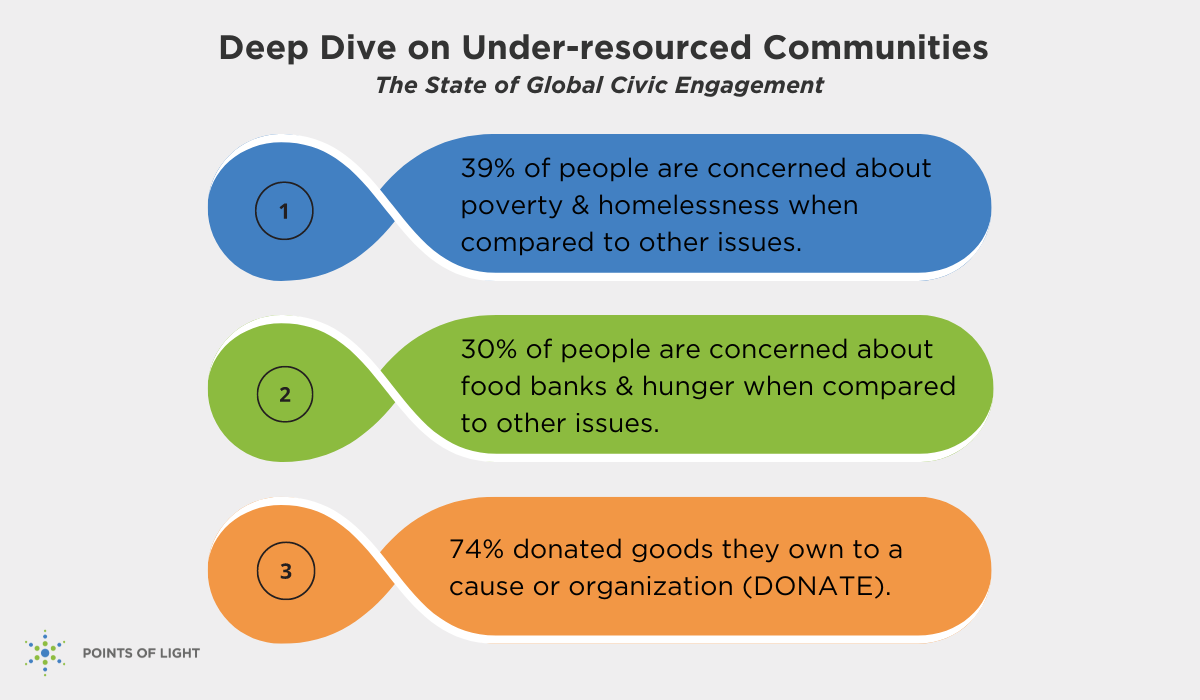Listen and Learn from Our Research on Under-resourced Communities

Knowing that under-resourced communities are often some of the most overlooked, nonprofit organizations around the world are focused on tackling issues that often affect them like poverty, homelessness and food insecurity. These organizations, along with the volunteers and businesses that support them, lend their time, talent and resources to addressing these tough issues through volunteering, donating and using their voice – all elements of the Points of Light Civic Circle®.
The Civic Circle framework is an essential tool that not only opens more pathways to civic engagement, it allows you to make your activism and advocacy work even more impactful. One of the best places to start is by listening and learning. With that in mind, let’s look at some lessons learned from our Points of Light research on these cause areas.
Questions to Ask When Engaging with Under-resourced Communities
POVERTY AND HOMELESSNESS
Poverty and homelessness is a prominent issue, with 4 in 10 people surveyed indicating concern. When we look at the ways that people are getting involved, the “Top Actions Taken” and what people consider to be “Most Influential” are donating and volunteering.
These are certainly critical actions, but it’s important to ensure that they’re not misguided or performative. With the absence of listening and learning, volunteers and donors may not be making the greatest impact they can – or worse, their impact may not be what’s needed most by the people who are most affected. That’s what makes listening and learning such an integral first step.
If you’re engaging with activism around poverty and homelessness, start by asking yourself a few questions:
- Am I listening to what the community needs?
- Could I be more effective with a deeper understanding of the issue?
- How do the social organizations I’m partnering with incorporate listening and learning into the opportunities for action they’re already providing?
Read about how Diannah Pennyman launched her nonprofit to aid people who are unhoused in Ohio and beyond.
FOOD BANKS AND HUNGER
Food insecurity is still prominent in communities around the world, even in the most developed nations. Hunger and food insecurity have been pervasive and enduring needs for a long time and, as with many other issue areas, the pandemic revealed the disparity and urgency around these issues. Thirty percent of people are concerned about food banks and hunger when compared to other issues, according to our research.
Food banks are a critical service to communities, both in times of disaster and day-to-day. It makes sense that the ways people are taking action around these issues are the traditional ways we respond to this need – by volunteering and donating. However, by incorporating other forms of engagement, like voice and vote, we may be able to work collectively toward addressing the root causes. In other words, by combining elements of the Civic Circle, you can amplify your efforts and make a bigger impact.
When engaging with activism around food insecurity, consider a few questions:
- How can I use my voice to campaign for more balanced allocation of resources in underserved communities?
- How can I advocate for better legislation that supports food insecure communities?
- How are the social organizations I’m partnering with address systemic change that could increase impact on a larger scale?
Check out how Miami teen Julia Krass is working to solve hunger and food insecurity in South Florida.
Want to keep diving? Take a look at these topics to find out how you can leverage our research to take civic action in your own community:
- Leverage These 10 Research-based Facts and Stories of Inspiration to Drive Change
- 5 Ways to Champion Sustainable Practices With Points of Light Research
- The Path Towards Equity and Social Justice: Lessons Learned from Points of Light’s Global Research
- Key Takeaways on Education and Literacy Development from Points of Light’s Research
